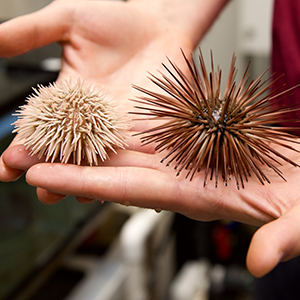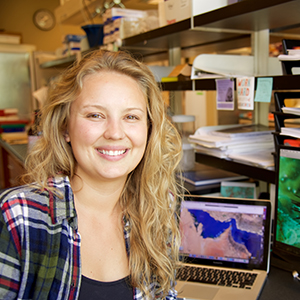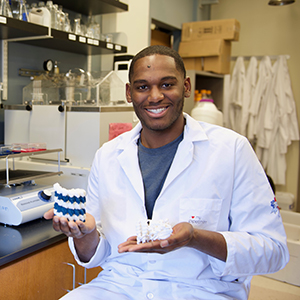Collaboration Extends Science’s Reach
Marine biologist Adam Reitzel is changing the way science is taught.
COLLABORATION EXTENDS SCIENCE’S REACH
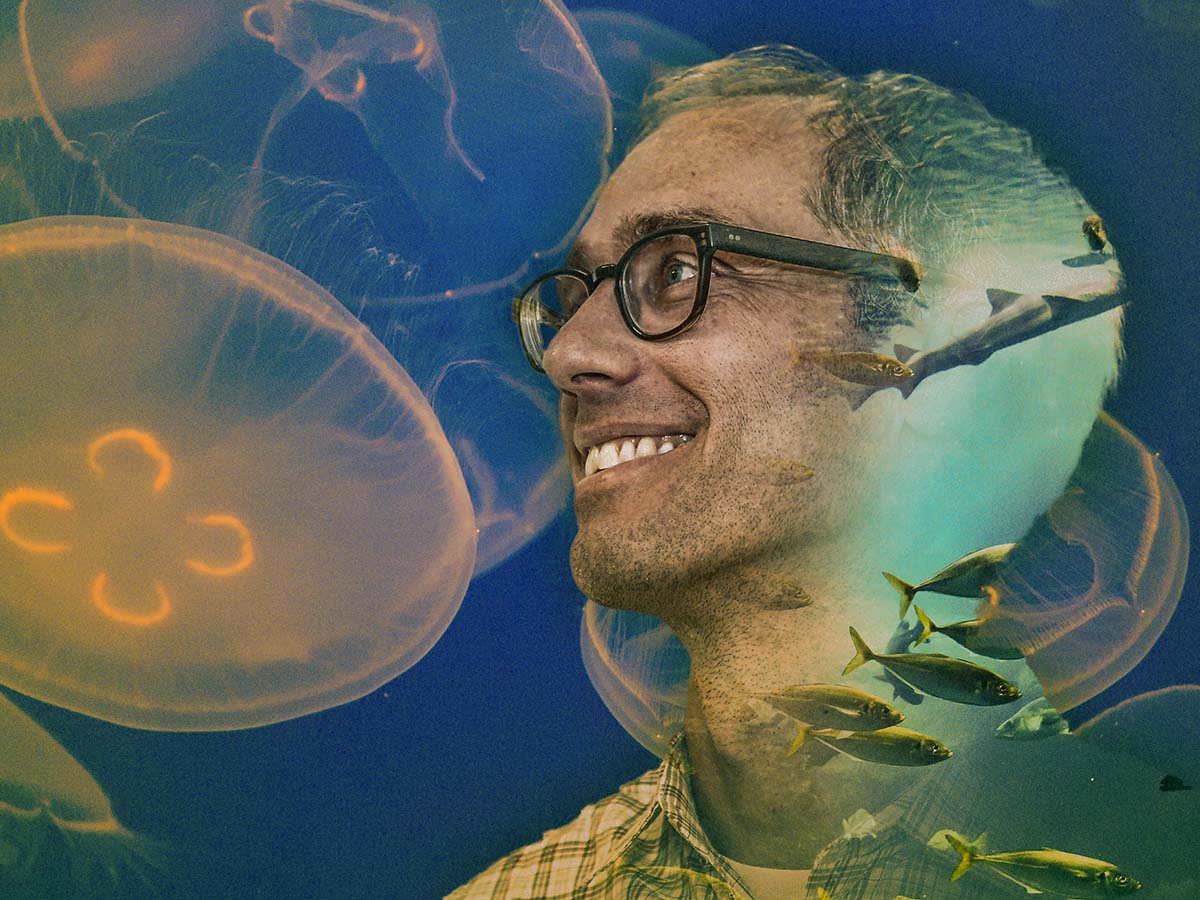
FROM FARM TO SEA
Growing up in Illinois surrounded by tasseled cornfields, Adam Reitzel had never dug his toes into the sandy shore. He had never seen the ocean’s waves or given much thought to jellyfish, anemones and sea urchins. That all changed in an advanced high school biology class, when he was inspired by a creative teacher.
Now, Reitzel is a marine biologist and self-described “nerd for invertebrates” who studies how coastal invertebrates—animals without backbones—respond to and may have evolved in response to stressors in the environment. This holds the potential to unlock clues about how species may be affected by ongoing climate change. His research is published in more than 70 papers and book chapters, impressive given his career as a professor began just six years ago.
He stands out also for the way he is changing fundamentally the way science is taught in schools, community colleges, universities and community settings — with an emphasis on collaboration.
“I like sharing ideas, uncovering solutions and coming up with creative ways of solving problems,” Reitzel said. “I collaborate with my undergraduate and graduate students in the lab, with other faculty members for ideas about how to do research and teach, and certainly with members of our extended community, such as high schools and organizations, for ways to put ideas together for more effective solutions.”
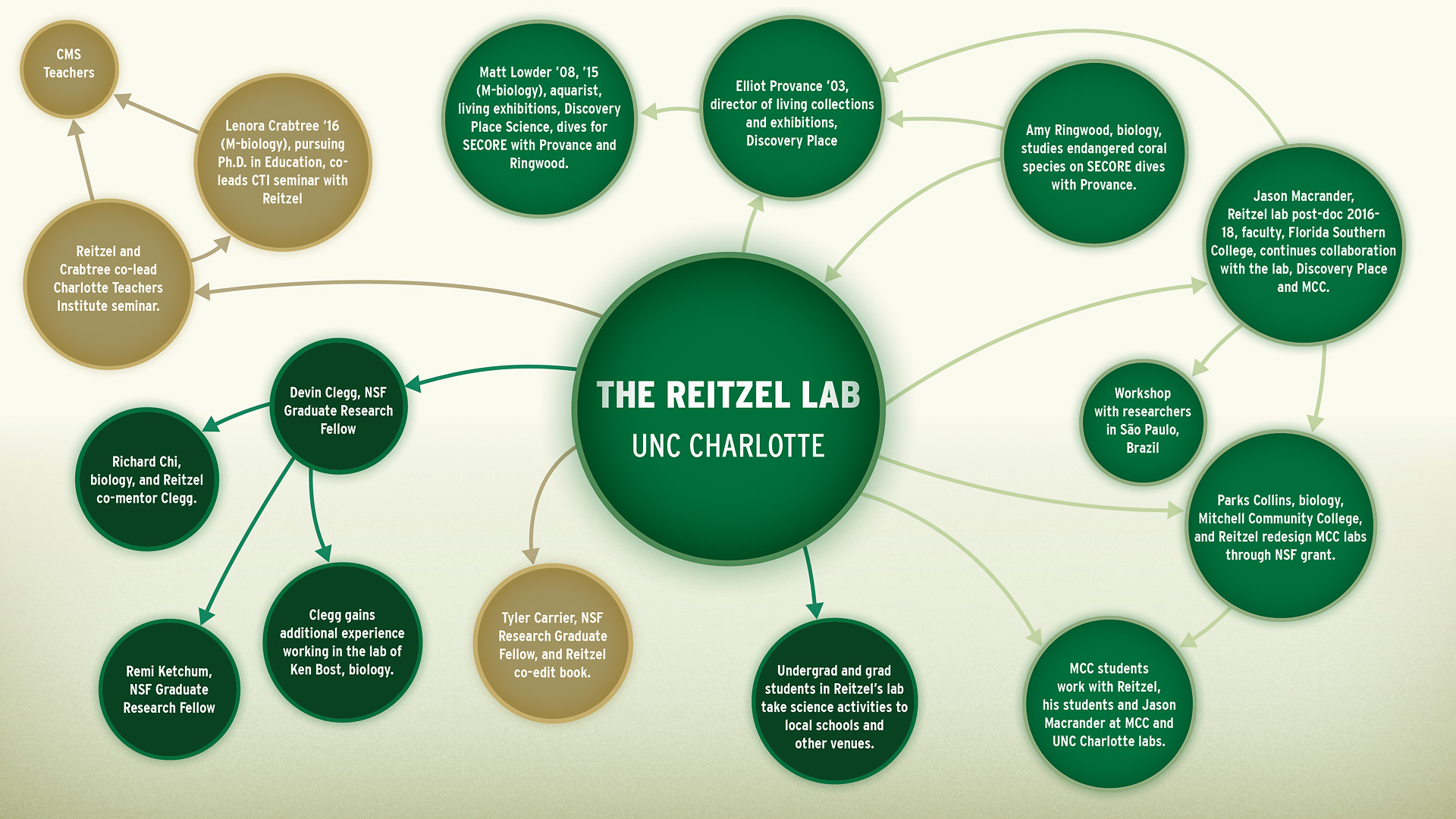
FAR-REACHING COLLABORATION
Lenora Crabtree first met Reitzel when she was earning a master’s degree in biology at UNC Charlotte after teaching science for 18 years. She is now working toward a doctoral degree in curriculum and instruction through UNC Charlotte’s Cato College of Education. Currently, they co-lead an intensive professional development seminar through the Charlotte Teachers Institute for Charlotte-Mecklenburg Schools teachers. Participants are coming up with new curriculum that will be accessible to any teacher or school locally and worldwide.
“Adam has a deep commitment to producing, and mentoring scientists who are well rounded, and grounded in science as well as sharing that science with the broader public,” Crabtree said. “Particularly at the K-12 level, we tend to teach science as a set of known facts to memorize as opposed to a way of knowing the world as something that is evolving and changing.”
The work of Reitzel’s lab is currently supported by more than $1.3 million in funding from the National Science Foundation (NSF), the National Institutes of Health (NIH), and a Young Investigators’ Grant from the Human Frontier Science Program, one of only seven awarded worldwide in 2016. The researchers seek a better understanding of how animals can respond to rapid changes in their environment, especially when these changes may be happening too swiftly for genetic adaptation to occur.
Reitzel is also partnering with instructor Parks Collins at Mitchell Community College (MCC) on NSF-funded work to redesign labs to focus on research, rather than memorization. They have shared this information with other MCC instructors, and Collins has presented their work at meetings of the NC Community College Association of Biology Instructors.
Working with Discovery Place Science in uptown Charlotte, Reitzel’s lab is inspiring people of all ages to discover science. A collaboration with Elliot Provance ‘03, director of living collections and exhibitions for Discovery Place, is a way for UNC Charlotte research to reach the public.
“The intent is to bring some of the species out onto the exhibit floor with information about the research, so people can see and learn from it,” Provance said.
For Reitzel, a common thread through his work is helping people see science as part of their lives.
“The model for collaboration we’ve developed can be translated to other groups and communities, where everyone’s ideas are elevated,” Reitzel said. “This gives people and organizations the confidence and opportunity to pursue their ideas—and we’re all better for it.”
NSF GRADUATE RESERACH FELLOWS IN REITZEL’S LAB
Student researcher explores undersea world
Q & A: NSF graduate research fellows enhance Reitzel’s lab
Former 49er defensive end tackles sea anemone research
